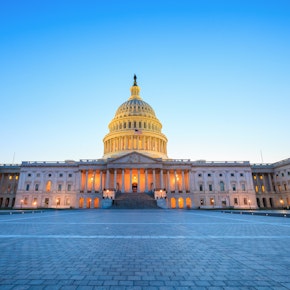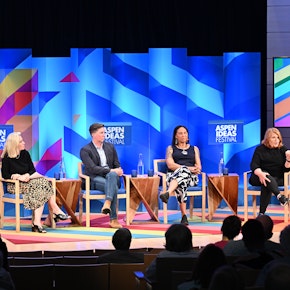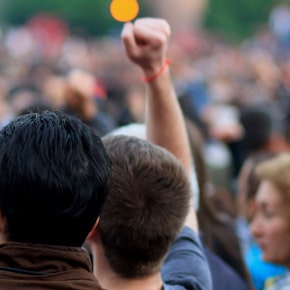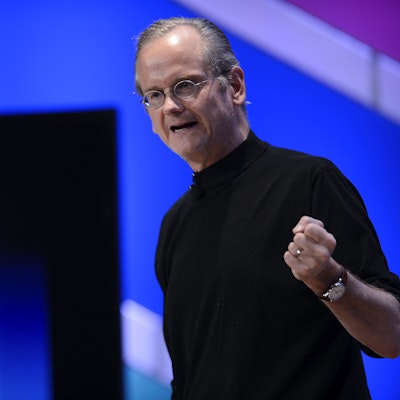Explore
Search results

Which countries are doing the most harm to democracy? And why is the United States struggling to maintain a healthy democratic system?


Authoritarian populists are gaining power from Ankara to Athens, from Warsaw to Washington. Meanwhile, popular support for democratic values is sliding in many countries around the world. Is our political system in existential danger? And what can we do to save it?

Creative expression takes many forms. Through history, art has provoked a range of feelings: emotion, empathy, fear, surprise, joy, compassion, anger. Now, amidst a time of national angst, where many in society might not hear the voices of those who don’t agree, a group of remarkable artists and political strategists are imagining ways that art can be used to catalyze dif...


Populations around the world have been electing more and more autocratic leaders in the past couple decades, via supposedly free, fair, and democratic elections. The freedom of the press is being impinged upon in many places, and fear, outrage and misinformation are often taking the place of reasoned debate. Minority populations in some countries are increasingly oppressed...

The world is in turmoil. From Italy to Turkey, and from Hungary to the United States, authoritarian populists have seized power. As a result, political scientist and author Yascha Mounk argues that democracy itself may now be at risk. How did we get here, and what do we need to do now? If we are unwilling to give up on either individual rights or the popular will, urgent a...

What if the threat to American democracy came from within our own military? “War Game,” a 2024 Sundance Official Selection documentary, imagined just such a scenario and convened a bipartisan group of policymakers to respond. What did they learn — and how real is the threat?

Across the globe, free and fair elections have given rise to autocratic regimes. Have we underestimated the fragility of democracy and overestimated its value? (Book signing with Shadi Hamid to follow.)

The notion of applying principles of democracy to governance has been around for centuries, increasingly popular as citizens across the globe discover the value of participatory government and the power that it invests in them. But is democracy working in the 21st century? Stanford historian Jack Rakove shares perspectives on the Founders' views of how the system should wo...



How can Americans restore their confidence in their government?

In the last decade, the people of democratic societies across the globe have elected autocratic leaders. These populist strongmen have undermined democratic institutions with a disregard for the rule of law, expertise, and the truth. Is their election the symptom of already advanced societal illnesses, or is it the disease itself? In countries where the damage to democracy...

As Israel marks its 75th birthday, the existential challenges it faces don’t only come from geopolitical vulnerabilities. How will the Jewish state confront internal divisions and divergent opinions about threats to its democratic institutions?

Our politics is polarized, and, with Donald Trump poised for a comeback, democracy is in peril. Drawing on themes from his book, The Tyranny of Merit: Can We Find the Common Good?, Michael Sandel explains how we arrived at this rancorous political moment and suggests how we can repair our civic life. Followed by a discussion with journalists David Leonhardt and Annie Murph...

Worried about the health of our democracy? There’s a bright light. Nation-wide the social sector is expanding to include NGOs led by a new generation, entrepreneurs building companies that offer a social return, networks of change-makers who share a profession or passion, and philanthropies taking many new forms. Together they’re tackling hard problems at the community and...

The vacuum created by the collapse of independent local news in America has given rise to ghost papers, partisan hackery, unverified rumors, and worse. Yet, new cohorts of news organizations are taking root to fill that void, often supported by philanthropy, public contributions, and new creative means of sustainability. At stake is the information that all citizens need t...


The cornerstone of democracy is the principle that all citizens have the right and ability to participate in their own governance, either directly or via representation. While many Americans today may believe that we’ve lost sight of that inclusive ideal, Rashad Robinson, racial justice activist and the president of Color of Change, points out that for some, the system has...

While more than 100 countries have adopted democracy over the last two centuries, it’s already been a decade since political scientist Larry Diamond posited a “democratic recession” sweeping the globe. The revolt of the middle class, the rise of China, and power grabs through military coups are just a few factors that suggest a disturbing trend of democratic deterioration....


Technology has changed the way we think and interact with one another, and social media platforms are intentionally engineered to be addictive and manipulative. Those messages are in the documentary "The Social Dilemma," which was created by Jeff Orlowski's filmmaking company Exposure Labs. "Big social," says Orlowski, is transforming our information ecosystem. He tells Vi...

When we speak and associate with others in real life, the First Amendment governs interactions, granting broad rights of individual speech and association. Yet when we interact online, we submit to terms of service from private companies. The consequence is that private platforms have become the new governors of speech and association. As if that weren’t bad enough, the pl...





